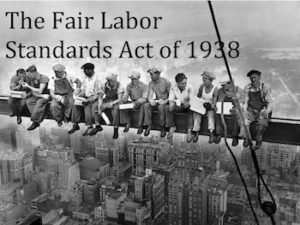
*The Fair Labor Standards Act (FLSA) became law on this date in 1938. Signed by President Franklin Roosevelt, it established a 25-cent minimum wage (that would rise to 30 cents beginning in October 1939), introduced a 44-hour maximum work week (that would first fall to 42 hours in October 1939 and would then fall to 40 hours in October 1940), and set the general age of workforce entry at 16.
It achieved a historic victory but a racially compromised one. when he signed the Fair Labor Standards Act (FLSA) of 1938. The law created the modern labor regulations that we're all familiar with today, including the minimum wage, overtime pay, and much more. The FLSA contained a major concession to southern Democrats, who successfully fought to exclude agricultural and domestic workers. That exclusion was crucial to preserving a southern way of life that hinged on exploiting cheap African American labor both in the fields through a sharecropper system an extension of slavery, and in homes where black domestic workers played much the same role they did in the Antebellum era.
Thanks to Cesar Chavez, the law was amended in 1966 to include some agricultural workers and again in 1983 to offer better protections to migrant farm workers. However, to this day, the protections for agricultural workers aren't as strong as those for other workers. As the National Farm Workers Ministry explains, under the FLSA, "farm workers have no right to overtime pay, workers on small farms are not entitled to receive minimum wage, and children as young as twelve are legally allowed to work in the fields." In addition, the National Labor Relations Act (NLRA) still exempts farm workers from protections around the right organize and bargain collectively.
Additional changes to the FLSA in the mid-1970s extended the law's protections to include domestic workers, but with a gigantic loophole: "companionship workers" were still not covered. And that category included many of the very domestic workers that Jim Crow-era legislators wanted to remain unprotected from federal law, including nannies, housekeepers, and companions for the aged. Like farm workers, domestic workers are also still not protected by the NLRA or by the Occupational Health and Safety Act. Though the right to collective bargaining is recognized worldwide as a basic human right and our own State Department annually critiques how well foreign countries uphold this right. As was the case in 1938, a huge share of the people who work in the domestic and agricultural sectors are nonwhite. They rank among the most poorly paid and impoverished workers in America, a fact that was also true in the 1930s. The exclusions to federal law demanded by yesterday's white supremacists continue, to inflict racially identified harm.
A few states have recently taken steps to correct this historic wrong, including New York which passed a Domestic Workers' Bill of Rights in 2010. California's Senate passed a similar bill, which labor activists are pressing the governor to sign. The Obama Administration's action in this area in 2013 didn't fully addressing the range of exclusions from federal labor law that disproportionately affect workers of color. But it's a big step in the right direction.